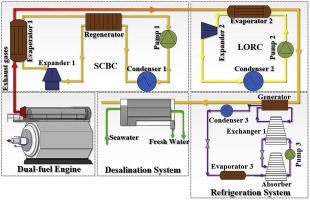Journal of Cleaner Production ( IF 11.1 ) Pub Date : 2020-07-27 , DOI: 10.1016/j.jclepro.2020.123289 Tiancheng Ouyang , Zixiang Su , Rui Yang , Changzheng Li , Haozhong Huang , Qifeng Wei

|
Waste heat recovery technology performs a significant function in energy conservation and pollution reduction. It is also an effective means for alleviating the current global pollution and energy shortage. For this purpose, an combined system, which includes a supercritical carbon dioxide Brayton cycle, a low-temperature Rankine cycle, an absorption refrigeration system, and a capillary seawater desalination system, is established. The accuracy of the system is primarily verified by comparing its results with those found in existing literature. Some sensitive parameters that affect system performance are subsequently analyzed step by step, and the performance of the subsystem under the maximum continuous operational load condition is determined. The electricity production, fresh water mass flow, and cold energy are found to be 123.97 kW, 138.82 kg/h, and 86.48 kW, respectively. Considering the contribution of the low-temperature waste heat recovery device, the equivalent electricity production of the combined system is optimized by genetic algorithm. After obtaining the optimal operational condition, the thermodynamic performance, economic performance, and energy evaluation indexes are calculated. The results demonstrate that low-temperature waste heat recovery devices can operate in a wide range of load conditions, and the electricity production, energy efficiency, and exergy efficiency of the combined system are 222.31 kW, 23.19%, and 75.29%, respectively. Compared with the original engine system, the thermodynamic and emission reduction performance significantly improve, hence, this design is economically feasible and is an effective technology for energy saving, emission reduction, and energy cascade utilization.
中文翻译:

评估和优化船用双燃料发动机中低级余热级联利用的框架
废热回收技术在节能和减少污染方面发挥着重要作用。这也是缓解当前全球污染和能源短缺的有效手段。为此,建立了包括超临界二氧化碳布雷顿循环,低温朗肯循环,吸收式制冷系统和毛细管海水淡化系统的组合系统。该系统的准确性主要通过将其结果与现有文献中的结果进行比较来验证。随后逐步分析一些影响系统性能的敏感参数,并确定在最大连续运行负载条件下子系统的性能。发电量,淡水质量流量和冷能分别为123.97 kW和138。分别为82 kg / h和86.48 kW。考虑到低温余热回收装置的作用,利用遗传算法对组合系统的等效发电量进行了优化。在获得最佳运行条件后,计算热力学性能,经济性能和能源评估指标。结果表明,低温余热回收装置可在各种负载条件下运行,组合系统的发电量,能源效率和火用效率分别为222.31 kW,23.19%和75.29%。与原始发动机系统相比,热力学和减排性能显着提高,因此,该设计在经济上是可行的,并且是节能减排的有效技术,



























 京公网安备 11010802027423号
京公网安备 11010802027423号